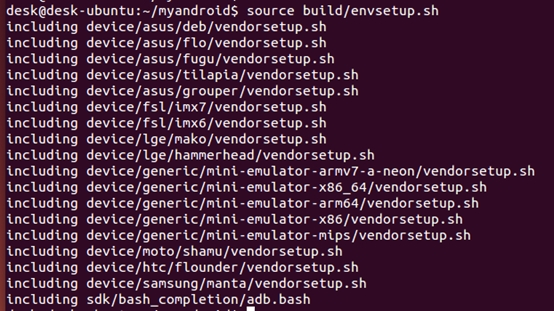i.mx6 Android5.1.1 build解析
参考资料:理解 Android Build 系统
把总结放前面:
1. 常用编译命令
| make clean | 执行清理,等同于:rm -rf out/。 |
| make sdk | 编译出 Android 的 SDK。 |
| make clean-sdk | 清理 SDK 的编译产物。 |
| make update-api | 更新 API。在 framework API 改动之后,需要首先执行该命令来更新 API,公开的 API 记录在 frameworks/base/api 目录下。 |
| make dist | 执行 Build,并将 MAKECMDGOALS 变量定义的输出文件拷贝到 /out/dist 目录。 |
| make all | 编译所有内容,不管当前产品的定义中是否会包含。 |
| make help | 帮助信息,显示主要的 make 目标。 |
| make snod | 从已经编译出的包快速重建系统镜像。 |
| make libandroid_runtime | 编译所有 JNI framework 内容。 |
| make framework | 编译所有 Java framework 内容。 |
| make services | 编译系统服务和相关内容。 |
| make <local_target> | 编译一个指定的模块,local_target 为模块的名称。 |
| make clean-<local_target> | 清理一个指定模块的编译结果。 |
| make dump-products | 显示所有产品的编译配置信息,例如:产品名,产品支持的地区语言,产品中会包含的模块等信息。 |
| make PRODUCT-xxx-yyy | 编译某个指定的产品。 |
| make bootimage | 生成 boot.img |
| make recoveryimage | 生成 recovery.img |
| make userdataimage | 生成 userdata.img |
| make cacheimage | 生成 cache.img |
2.常用命令:
我们正常步骤为:
1). source build/envsetup.sh
2). lunch
3). make -jx
build/envsetup.sh
打开build/envsetup.sh,发现里面全都是函数,折叠全部函数,一直拖到最后,发现代码
if [ "x$SHELL" != "x/bin/bash" ]; then case `ps -o command -p $$` in *bash*) ;; *) echo "WARNING: Only bash is supported, use of other shell would lead to erroneous results" ;; esac fi # Execute the contents of any vendorsetup.sh files we can find.
#包含各种vendorsetup.s脚本文件进来,然后去执行
for f in `test -d device && find -L device -maxdepth 4 -name 'vendorsetup.sh' 2> /dev/null` \
`test -d vendor && find -L vendor -maxdepth 4 -name 'vendorsetup.sh' 2> /dev/null` do echo "including $f" . $f done
unset f addcompletions

查看发现没错,查看lunch
function lunch() { local answer #如果有第一个参数 if [ "$1" ] ; then answer=$1 else #如果没有参数,就进入print_lunch_menu函数 print_lunch_menu echo -n "Which would you like? [aosp_arm-eng] " read answer fi local selection= if [ -z "$answer" ] then selection=aosp_arm-eng elif (echo -n $answer | grep -q -e "^[0-9][0-9]*$") then if [ $answer -le ${#LUNCH_MENU_CHOICES[@]} ] then selection=${LUNCH_MENU_CHOICES[$(($answer-1))]} fi elif (echo -n $answer | grep -q -e "^[^\-][^\-]*-[^\-][^\-]*$") then selection=$answer fi if [ -z "$selection" ] then echo echo "Invalid lunch combo: $answer" return 1 fi export TARGET_BUILD_APPS= local product=$(echo -n $selection | sed -e "s/-.*$//") check_product $product if [ $? -ne 0 ] then echo echo "** Don't have a product spec for: '$product'" echo "** Do you have the right repo manifest?" product= fi local variant=$(echo -n $selection | sed -e "s/^[^\-]*-//") check_variant $variant if [ $? -ne 0 ] then echo echo "** Invalid variant: '$variant'" echo "** Must be one of ${VARIANT_CHOICES[@]}" variant= fi if [ -z "$product" -o -z "$variant" ] then echo return 1 fi #到处环境变量 export TARGET_PRODUCT=$product export TARGET_BUILD_VARIANT=$variant export TARGET_BUILD_TYPE=release echo set_stuff_for_environment printconfig }
function hmm() { cat <<EOF Invoke ". build/envsetup.sh" from your shell to add the following functions to your environment: - lunch: lunch <product_name>-<build_variant> - tapas: tapas [<App1> <App2> ...] [arm|x86|mips|armv5|arm64|x86_64|mips64] [eng|userdebug|user] - croot: Changes directory to the top of the tree. - m: Makes from the top of the tree. - mm: Builds all of the modules in the current directory, but not their dependencies. - mmm: Builds all of the modules in the supplied directories, but not their dependencies. To limit the modules being built use the syntax: mmm dir/:target1,target2. - mma: Builds all of the modules in the current directory, and their dependencies. - mmma: Builds all of the modules in the supplied directories, and their dependencies. - cgrep: Greps on all local C/C++ files. - ggrep: Greps on all local Gradle files. - jgrep: Greps on all local Java files. - resgrep: Greps on all local res/*.xml files. - sgrep: Greps on all local source files. - godir: Go to the directory containing a file. Look at the source to view more functions. The complete list is: EOF T=$(gettop) local A A="" for i in `cat $T/build/envsetup.sh | sed -n "/^[ \t]*function /s/function \([a-z_]*\).*/\1/p" | sort | uniq`; do A="$A $i" done echo $A }



 浙公网安备 33010602011771号
浙公网安备 33010602011771号